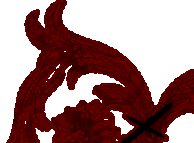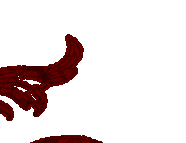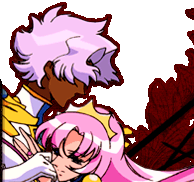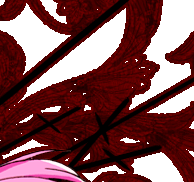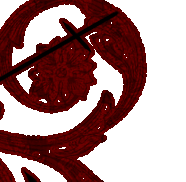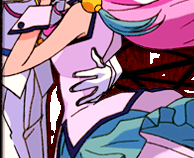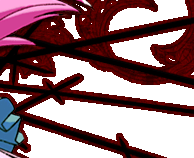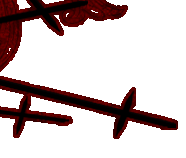
Written by Lt. Tangerine, 2018
Fans of Berserk and Revolutionary Girl Utena, you have so much to talk about! Something magical happened in 1997, by sheer coincidence two shows from very opposite parts of the anime universe were born. The similarities between them are quite intriguing and not limited to; a hero with their trusty sword, ambiguous queer love, deep emotional trauma, and epaulets.
One major difference between the two shows is that the 25 episodes of Berserk’s 1997 TV series is just a small portion of a much larger story that continues in manga form. Revolutionary Girl Utena has other works within the cannon, but they are all essentially iterations of the same concept. I will only be focusing on the 1997 television series of these two shows.
Spoiler-ish free summary of the two shows to convince you to watch the show you haven’t seen and circle back:
After engaging in a duel, our sword-wielding hero is swept up into trials for power. Along the way they build an intense friendship with the mysterious member of the same sex, who they find themselves somewhat bound to, and eventual comradery with the other participants in the conquest. Though the games are different, both our heroes are unknowingly fighting towards a goal that is not their own. True natures are revealed, and everything the hero thought they knew was wrong.
Behind the scenes overlap:
•Art Director: Shichiro Kobayashi (both)
•Akiko Yajima: Voice of Rickert/Ricket (Berserk) and Mitsuru Tsuwabuki (Revolutionary Girl Utena)
•Yuri Shiratori: Voice of Charlotte (Berserk) and Nanami Kiryu (Revolutionary Girl Utena)
Despite being post production overlap, I want to acknowledge the english dub voice actors:
•Rachael Lillis: Voice of Utena Tenjou (Revolutionary Girl Utena) and Charlotte (Berserk).
•Gregory Abbey: Voice of Tatsuya Kazami (the Onion Prince in Revolutionary Girl Utena) and Godo (The blacksmith in Berserk)
•Lisa Ortiz: Voice of Kozue Kaoru (Revolutionary Girl Utena) and additional voices in Berserk.
•Dan Green: Voice of Mikage (Revolutionary Girl Utena) and Valencia (Berserk)
•Tara Sands: Additional voices for both Revolutionary Girl Utena and Berserk.
The Main Characters:
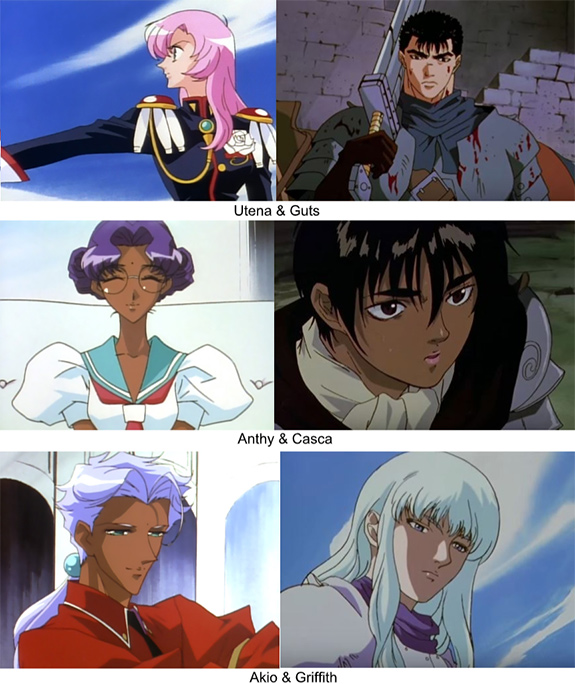
Character Comparisons:
The most overlap exists in the combinations listed above, however, there are many instances where Anthy and Griffith share similar experiences, and so on. I am going to exclude combinations where there is little to no similarity.
•The brave and reckless hero.
Utena and Guts are the protagonist of their stories orphans who are scarred by the traumatic death of their parents. They are hard-headed, strong-willed and a true friend. They are driven, with the ability to inspire through their genuine connection to others. They strive to remain true to their ideals.
They value friendship above all else, but learn a hard lesson about the friend they think they know best. They realize that they don’t really know who they are at all, and are both betrayed in the end by that friend.
•The romantic object.
Personality wise, Anthy and Casca are near opposites; their similarity is that they are both the ‘damsel in distress’ of the love triangle. These are no conventional circumstances however, because their would-be suitors also have romantic tension between themselves.
I labeled them as damsels because the outside world sees them this way, but they really aren’t. Casca outwardly seems to have more power, but Anthy uses people’s lack of consideration to her advantage. Casca, like Utena, pursues power in a more traditionally masculine way. She has agency and the desire to lead.
•The fallen man of ideals.
Akio and Griffith are two men who are so driven by their single-mindedness that it blinds and isolates them. They are completely consumed by their quest for power, willing to use people as objects and discard them when they are no longer useful. Sex is also a tool in their quest. This journey for greatness is a lonely one, but they have learned to stop caring.
In Revolutionary Girl Utena, we meet Akio long after he has fallen from grace. He is a man divided, the goodness in him sealed away in the form of Dios. What is left is the devilishly pragmatic Akio whose goal is to reclaim the power locked away within his other self. We learn his story through a play, it’s mythical at this point. In Berserk the climax of the story is Griffith’s fall, when he fully surrenders himself to his desire for power, selling his soul and the souls of his comrades to devils.
When the fall and transformation occur, both characters assume a new name, symbolically shedding their old identity. Dios becomes Akio a.k.a ‘End of the World’ and Griffith becomes Femto. Griffith’s transformation into Femto is a ritual put on by the God Hand’s, whereas Akio creates a ritual out of his fall. Akio reenacts his sister's sacrifice over and over in hopes to reclaim the power he lost the moment he lost himself.
•The girl with a sword.
Both Utena and Casca consistently have to push back on gender norms to command respect from those around them. Their femaleness is always seen as a weakness, a fault in their person. They’re pressured by the idea that they would be much happier if they just assumed a more traditional female role.
They are both in love with a man they can’t and shouldn’t have. Despite being engaged, Akio purposefully seduces Utena as the final step in his plan to groom her. Griffith seems aware of Casca’s feelings, but is ambivalent, until she starts a romance with Guts. Neither man is capable of real love, they only see other people as objects.
•The chosen one.
Utena and Griffith are the ‘chosen one’ of their story. Both are given a mysterious piece of jewelry that set them on the path to their destiny; they are chasing the dream of the castle, an ideal. Utena’s is upside down hanging impossibly from the sky and Griffith’s is always just out of reach upon the horizon. This makes them special but also leads to their downfall.
Both characters fail and succeed in their quest. Griffith wanted the power of a king, a dream that was impossible in the broken state that he was in in the finale. He knew this, so when he was given a second chance at power, to become a demon god, he took it, even at the cost of all his friends lives.
Utena’s goal was always divided. She wanted to meet her prince again, and simultaneously become one herself. Unknown to the audience until the very end and forgotten by Utena, she had a third goal. When the Dios met her and gave her the ring, he showed young Utena the eternal suffering of Anthy. This made Utena vow she’d become a prince to save Anthy, since Dios couldn’t. Utena fails the final duel and all it entails. Before the million swords take her, Utena also believes she’s failed. In the end, we learn that she did save Anthy. She gave her the courage to leave Ohtori Academy and her brother Akio.
•The living dead.
Old souls suffering in silence, Anthy and Griffith have personally sacrificed so much for themselves and others. Both have used their sexuality for survival and manipulation. Both, in many ways, have dissociated from their bodies, living in their mind as a means for sanity.
It is towards the end of the series that their similarities become most apparent. They both suffer under long and extreme imprisonment circumstances. Griffith is held captive, tortured and mutilated, alone with only his darkness. Anthy has been suffering for thousands of years in her coffin, with the swords of human hate within her. They are also both ritually sacrificed at the end. Griffith’s sacrifice is a rebirth, Anthy’s is routine at this point, and unbeknownst to her the last time.
•The gods.
The God Hand are evil and enjoy being evil, whereas Dios is good, but the line between his powerlessness and ambivalence is a bit muddled. They are the final witnesses to the suffering of our heroes.
Shared Themes:
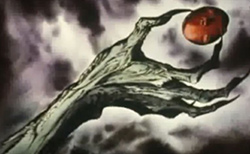
•A repeated message at the opening:
“In this world, is the destiny of mankind controlled by some transcendental entity or law? Is it like the hand of God hovering above? At least it is true, that man has no control, even over his own will.” - Unnamed narrator.
This monologue occurs at the beginning of each episode of Berserk, foreshadowing of things to come in the finale. I would say indications specifically about Griffith as it is his ‘will’ that has the biggest consequences in the end. The hand looks like a tree, but also like Griffith’s withered hand after he is freed from his prison.
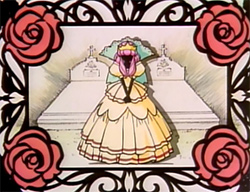 “Once upon a time, many years ago, there was a little princess, and she was very sad, for her mother and father had died. Before the princess appeared a traveling prince, riding upon a white horse. He had a regal bearing and a kind smile.
“Once upon a time, many years ago, there was a little princess, and she was very sad, for her mother and father had died. Before the princess appeared a traveling prince, riding upon a white horse. He had a regal bearing and a kind smile.
The prince wrapped the princess in a rose-scented embrace and gently wiped the tears from her eyes. "Little one," he said, "who bears up alone in such deep sorrow, never lose that strength or nobility, even when you grow up. I give you this to remember this day. We will meet again. This ring will lead you to me one day."
Perhaps the ring the prince gave her was an engagement ring. This was all well and good, but so impressed was she by him that the princess vowed to become a prince herself one day. But was that really such a good idea?”
In Revolutionary Girl Utena this sequence is repeated, but it isn’t shown every episode. It opens the first episode and then is sprinkled in as a reminder to the audience as the thesis of the show. With each retelling, it changes and loses meaning. Later in the series we learn it's a watered down version of another tale, and even that might be a lie. All the audience can do is continue to ruminate on that final sentiment, ‘was that really such a good idea?’
•The chance encounter:
Utena meets her prince and is given a ring. Griffith meets a fortune teller and is given a necklace holding a Behelit. Both of the gift barriers are mysterious and vague in their messaging as they bestow their gifts.
“It’s called a Behelit, the egg of the king. The owner of this necklace is destined to hold the world in his hands, in exchange for his flesh and blood.”
We hear about this only twice, first from Griffith himself. Guts notices the odd necklace and Griffith repeats what the old woman told him. The second time is in episode 22, as a flashback of the moment Griffith was given the necklace.
“Little one, who bears up alone in such deep sorrow. Never lose your strength or nobility, even when you grow up. I give you this ring to remember this day. We will meet again. This ring will lead you to me, one day.”
This is part of the repeated sequence in Revolutionary Girl Utena.
•Possession by duel:
Anthy becomes Utena’s ‘bride’ through a duel. This is sort of an accident. Utena challenges the current victor, Saionji, to a duel, when she finds out that he hurt a friend of hers, Wakaba. Saionji misunderstands the situation, noting Utena also wears a duelist ring like the rest of the student council members. We then learn there is a system in place where the student council members compete to gain the power-- ‘revolutionize the world.’ Anthy, who is known as the Rose Bride, is one of the prizes passed around to the victor.
After the duel, Anthy meets Utena outside and tell her: “I am the Rose Bride. From this day forward, I belong to you.”
Guts, wounded is discovered by Griffith and the Band of the Hawk. Griffith takes an interest in Guts and offers him a place in his company. Guts refuses, he fights only for himself. Griffith challenges Guts to a duel, and Guts loses.
“Now you are mine,” Griffith says to Guts after the duel. An episode later he goes into more detail of what that means. “You belong to me. I will choose the place where you will die for me.”
Both Guts and Utena are unwilling participants in these arrangements, but Guts is the possessed, where Utena is the possessor.
• The castle of dreams:
In Revolutionary Girl Utena the ideal of the castle is introduced right away. It is a main motivator of the duelists, one of the spoils of the ultimate victor. They are promised to enter the castle to gain the power to revolutionize the world
In Berserk, the castle is introduced once we start to see into the mind and motivation of Griffith. We know he wants power and has fought hard to for the modest status he’s achieved. It isn’t until the end of the series that we see how big his ambitions really are. He is warned he will have to crawl over corpses to ever reach it.
In both shows, the castle represents the promise of ultimate power that is just out of reach. We never see inside the castle, which makes it both universal and deeply personal to those dreaming of it. It's a blank canvas that anyone can imagine their dreams on, but it is an illusion, literally in Revolutionary Girl Utena. Akio projects the castle from his planetarium projector, along with many other illusions to the duelists.
•The unchosen:
We don’t learn as much about the more prominent side characters of the Band of the Hawk; Pippin, Rickett, Judeau and Corkus, but like in Revolutionary Girl Utena there are those who are special and those who are not. As unchosen, the members the Band of the Hawk are sacrificed to the God Hand.
In Revolutionary Girl Utena we spend whole episodes learning about the other duelists, Touga, Saionji, Juri, Miki, and Nanami. All student council members, special in their own right, stand apart from the other students, but at the end of the day are still unchosen.
•The loss of the possession:
At one point in the story both Utena and Griffith lose their friend/possession, and it deeply affects them. It can also be seen as the disillusion of the friendship.
Utena loses a duel (Note: the only time she ever loses) and therefore loses possession of Anthy. Utena had been frustrated about being involved in the duels and spent her time as the victor trying to prove that she is nothing like the student council members she fights against. Utena doesn’t want to possess Anthy, she wants to be her friend, help her, and free her.
When Utena loses she is faced with two truths: First the reality of who Anthy is, and what it means to be the Rose Bride. Touga, the duelist who beats Utena, says that the Rose Bride does whatever the winner of the duels says. All the progress Utena thinks she has made on Anthy, getting her to open up, and wanting to have friends, has only been Anthy parroting Utena’s desires back to her. To demonstrate, Touga makes Anthy tell Utena she likes being the Rose Bride.
The loss crushes Utena and causes her to completely lose her sense of self. She starts wearing a regular girls’ student uniform and becomes completely apathetic. Only after the sense is literally slapped back into Utena, does she listen to the urging of her friend Wakaba to take back who she was. This is the second truth, Utena has unknowingly acquired a sense of self-worth from possessing the Rose Bride, making her not unlike the rest of the Student Council. Utena then re-challenges Touga to a duel for Anthy and wins. This episode is aptly called “For Friendship, Perhaps.”
The moment happens for Griffith once he and the Band of the Hawk win the Hundred-Year War for the King of Midland. They receive a hero’s welcome back at the castle and it appears that the Band of the Hawk's days of nomadic mercenary life are over. Griffith sets his eyes on the next phase of his personal conquest of power by trying to woo the King’s daughter, Charlotte. While the other members of the Band of the Hawk enjoy their time of comfort and leisure in the King’s court. Guts is restless and uneasy, unable to adjust to the new way of life. Griffith requests Guts to do him personal a favor, by killing a nobleman conspiring against him. Guts takes the assassination request, and succeeds, but is forced to kill the man’s son as well, to cover his tracks.
This incident leaves Guts conflicted. He is a mercenary, not an assassin. The rift between the two men grows when Guts overhears Griffith talking to Charlotte and reveals that he can only respect and be friends with equals, and Guts and the Band of the Hawk in his mind are not. This crushes Guts and he realizes he must leave Griffith and the Band of the Hawk to fulfill his own dreams, so he can stand beside Griffith, as his equal.
When Griffith hears that Guts is leaving he refuses to let him go, reminding Guts that he won his life. Guts challenges Griffith and wins, so he leaves. Griffith is destroyed, and recklessly goes to Charlotte's bedroom and rapes her. The rape is discovered, and Griffith is locked away by the king.
• Together as equals:
Both Utena/Anthy’s and Guts/Griffith’s relationship are about becoming equals. Neither friendship fully achieves this idea. Guts and Utena are the ones who want their friendships with Griffith and Anthy to be equal.
Griffith never see Guts as his equal and it’s mostly clear that he has no desire to ever have Guts be. Guts is special to Griffith in a way he is never able to put into words, but ultimately Guts is just one of the many people he sees as tools to get what he wants.
Anthy deep down desires the friendship Utena offers her, but she is too afraid to trust what Utena says is true. Only in a brutal moment of honesty, the night before the final duel, do the girls come clean to each other. Anthy confesses using Utena’s kindness and naivety. More surprisingly, Utena confesses to using protecting Anthy for her ego, never taking the time to understand her suffering. This is their first real step towards true friendship, yet Anthy still betrays Utena at the end, forcing herself to believe Utena couldn’t be her prince.
The Finale:
It’s the last three episodes of the two series where the similarities really begin to overlap, lining up with very similar beats. In the finales Utena/Guts, Anthy/Griffith and Akio/Griffith have the most overlap. Where they differ in the finale is Revolutionary Girl Utena is about the salvation of Anthy, and the redemption of Utena and Berserk is about Griffiths fall into demon hood and the severing of his relationship with Guts.
•The choice:
Episode 23 of Berserk and episode 37 of Revolutionary Girl Utena are about making a choice. It is sunset for both shows, the twilight of the story is near as our heroes enter the abyss. Utena must choose to participate in the final duel and Griffith must accept his invitation from the God Hand. Utena and Griffith spend the episode thinking about their current situation and the future. Both characters were chosen for a destiny because of some special trait inside them and both were given a token that lead them to their destiny. They each accept the invitation at the end of the episode during the setting sun.
•The setting of the final stage /Everything you thought you knew is wrong:
Episode 24 of Berserk and episode 38 of Revolutionary Girl Utena take our heroes to the last and true stage of their journey. Griffith and the entire Band of the Hawk are taken to the Astral world, which is a hellish nightmare of demons. It is revealed that Griffith was selected for a special destiny, as the final member of the God Hand. When Utena arrives at the final duel, Akio reveals to Utena that the dueling stages and the castle were projections created from the chairman's tower. And that all things begin and end there. He is The End of The World.
These are dialogue-heavy episodes. Akio and the four members of the God Hand attempt to break our chosen one through words, because even though the previous episode was about choice, there is still one true choice left to be made. Griffith must choose to sacrifice his friends in order to become the last member of the God Hand. Utena must choose to become Akio’s princess, leaving Anthy to be the Rose Bride forever, or deny Aiko’s offer and become a prince herself to try and save Anthy.
The God Hand take Griffith through his memories to convince him to join. He faces the mound of people who have died because of him and is forced to accept that their deaths were necessary for his quest to achieve power. Griffith must give up on redemption and regret and step upon the skulls of the fallen to make it to the castle. The God Hand offer a way out of guilt and into power.
Akio takes Utena through all the different stages of her duels, attacking her intentions and integrity from all angles. He points out that all the duels were a game with no real consequences. Anthy is a witch and is happy being a witch, willingly participating in the deception. He highlights that Utena never truly tried to understand Anthy, despite wishing to save her. He shows her own sense of moral superiority is hypocritical; she had an affair with him even though he was engaged.
Guts tries to get through to Griffith to convince him not to join, but he is unmoved. Guts presence even goads Griffith in his choice against his comrades. Guts was the one who derailed him from his original path. It was Guts leaving that drove him to rape Charlotte. Griffith makes his choice to become a God Hand, dooming his comrades.
Utena chooses to become a prince. We then learn that there were two choices that had to be made. Anthy had to make a choice too; she could align herself with Utena or continue to follow her brother Akio. Anthy reject Utena’s declaration to be a prince and during the duel stabs her in the back, literally. Anthy betrays Utena, even though she was fighting to save her.
This is where both show’s second to last episode ends. We are basically in the pit of hell. The choices have been made, now we wait for the rituals to begin.
•Encasement:
After Griffith accepts the offer to join the God Hand he is encased in the giant red hand that shoots from the ground holding him high apart from the others.
After Anthy agrees to perform the sacrifice of the Rose Bride, she vanishes from her dress and reappears in the sky to be stabbed by a million swords. So many, they encase her.
•Mocking the foolish hero:
Guts tries to break the “cocoon” that Griffith is encase in as the God Hand watch on and mock the futility of his efforts. Guts tells them to shut up in frustration. Guts dagger eventually breaks against the cocoon and it starts to sink in that there is no way of getting through to Griffith.
In Revolutionary Girl Utena a similar scenario plays out, but in two different scenes. First Akio uses Utena’s soul sword on the rose gate that holds the power to revolutionize the world. Each blow of the sword pains Utena physically. Thrashing it against the door over and over, until it eventually breaks. Akio promptly gives up, noting that Utena’s sword still wasn’t the right one.
Utena later attempts to open the rose gate as Akio and Dios watch on. Akio drones on about how fruitless Utena’s efforts are, and she too tells him to shut up. Where this differs it that Utena is, in fact, able to open the gate and Anthy’s coffin, truly connect with the girl inside.
•Inside the Coffin/Cocoon:
Berserk is pretty cut and dry about what is happening, Griffith is gestating inside the giant fist he is encased in before he is reborn as Femto.
In Revolutionary Girl Utena we learn Anthy has been trapped inside her “coffin” all along. The coffin is a hollow stasis of existing; you aren’t dead inside, nor are you truly alive.
•The human sacrifice:
A price must be paid for power, the person paying is what differs. We are back to Griffith and Akio being more aligned. Griffith must sacrifice his friends to become a god and Akio sacrifices his sister for the chance to break open the power to revolutionize the world.
•The kiss in the darkest hour:
After being stabbed, Utena helplessly watches Anthy as she’s sacrificed to the million swords of human hatred, while Akio tries to open the door with her soul sword. Dios appears on a white horse merry-go-round and talks at Utena. He pities and patronizes her, before offering a kiss on her ring as comfort.
This moment bookends Utena’s relationship with Dios. As a young girl, she met a mysterious prince who gave her a kiss, a ring, and a promise to meet again. Now promise kept, the ring led Utena to Dios and to the dire situation she's in. After all these years, he can still only offer a kiss and some comforting words. This motivates Utena to get back up and keep fighting.
“A kiss, to show my appreciation. The only comfort I can offer.”
In Berserk, this scene happens in the fourth to last episode, right before Guts and the Band of the Hawk rescue Griffith from the dungeon. We see Griffith now a husk of the person he was. We have no idea how long he has been in the darkness of the cell when red monsters ooze from a hole in the wall. Is it a hallucination? The ooze is a part of the demon collective of the God Hand, making their first point of contact with Griffith.
“O, Prince. O Prince of the unforgiven… We are honored to be received in audience.”
• Making the hero suffer/desperate struggle.
Berserk is famous for its surprise gruesome ending for its cast. All members of the Band of the Hawk die a horrible death by demons in honor of Griffith’s rebirth, leaving Guts and Casca to barely survive in a lake of their blood.
Guts, while trying to save Casca, gets his arm bit by one of the monsters. Desperate to break away, he has to hack off his arm with a broken blade to get away. Unfortunately, he is then pinned down and forced to watch Griffith, now reborn as Femto, force himself on Casca.
After being stabbed, Utena finds the strength to attempt to save Anthy and hobbles towards the rose gate. Akio has just given up on opening the door with Utena’s sword. He sees Utena start to fall over and runs to catch her, but his sugar sweet words and touch are gone. Utena isn’t useful in his eyes anymore. Utena shoves him away as he drones on about the futility of her actions, so hard she falls to the ground herself. Akio leaves her to struggle.
•You are the one who…
Griffith to Guts:
As the cocoon is closing around Griffith. “You. Out of all the thousands of comrades, only one, only you and you alone skewered the vision of my dream.” Griffith thinks this as Guts tries to talk him out of his choice, but it only encourages him to ‘submit.’
This moment happens twice in Revolutionary Girl Utena.
Anthy to Utena: “Oh, stubborn and reckless hero...You let me have a small taste of true friendship. Farewell." Anthy says this after betraying Utena.
Utena to Anthy: “Himemiya. You still don’t know... The only time I ever been really happy, was when I was with you.” This confession is what opens the gates and finally brings Utena to Anthy’s coffin, to find the real person locked inside.
•The last tear:
While gestating inside his egg, Griffith sheds his very last tear. A voice speaks to him.
“When a person knows the deepest suffering one can bear. So deep, that they break free from their original self, their compassion dies.” This is a necessary step in Griffith’s transformation. Part of letting go of his humanity.
(Sorry it's super dark, but the tear drops into a pool and ripple in the second Berserk image)
Utena, desperate to open the Rose Gate to save Anthy, confesses; “The only time I ever been really happy, was when I was with you.” Utena then sheds a single tear and it trickles into the door handles’ pool and bounces back to her ring. This is a call back to how the door to the dueling area is opened (minus the tear). This opens the gate to bring Utena to Anthy’s coffin, which she then opens to find Anthy’s true self inside.
•The journey at our hero’s back:
Berserk’s end is at its beginning. The first episode of the series takes place in what is considered the ‘present time’ and Guts is hunting down demons in pursuit of Femto. At the end of the first episode, Guts walks off having just thwarted a demon and recalls how he got to where he is today. The shows’ actual finale ends with Guts blacking out as he watches Femto rape Casca. I’m assuming that decision was made to allow the possibility of a second season, which never happened.
Revolutionary Girl Utena ends with Anthy leaving her brother to seek out Utena in the ‘outside world.’ The end credits of the finale are of Anthy walking away from Ohtori academy. This ending is unexpected as the audience is led to believe that this is Utena’s story, but it just as much Anthy’s.
In a way, both stories endings are escapes before a new journey. Anthy escapes from her brother’s control, learning she only needed to walk away. She is also leaving to find Utena. Guts escaped the gates of hell, and we can only wonder how he did. He is now on a quest to find Griffith and get his revenge.
-Lt. Tangerine
 |

